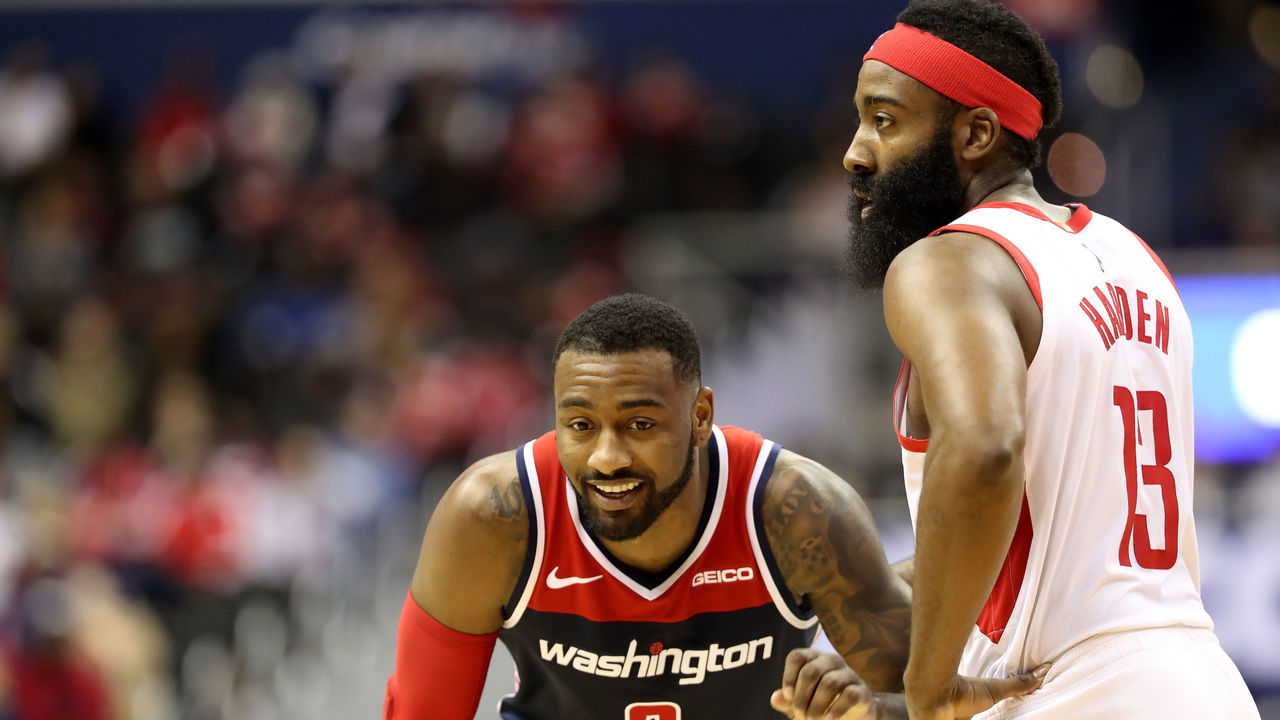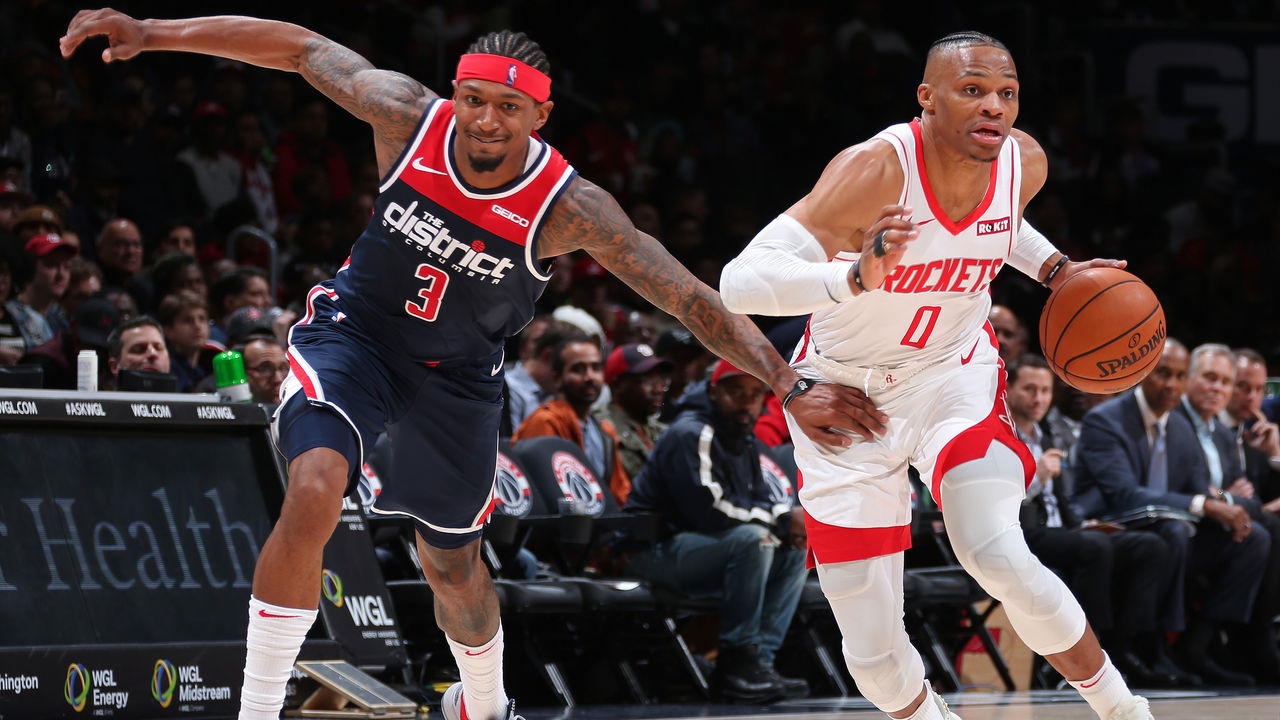In a blockbuster akin to a couple teams rearranging expensive deck chairs on a sinking ship, the Houston Rockets traded Russell Westbrook to the Washington Wizards for John Wall and a future first-round draft pick. Here's what the deal means for the parties involved:
Rockets take another step back

Westbrook's on-court value may not match the monetary value of his contract, and he's two years older than Wall, but Wall arrives in Houston on an equally burdensome deal, and with far more questions to answer about his current standing in the league.
Opening week of the coming season will mark two full years since Wall last appeared in an NBA game. The five-time All-Star underwent left heel surgery in January 2019, which led to an infection. While dealing with that already complicated recovery, a slip and fall at his home resulted in a ruptured Achilles. Wall's also had surgery on both knees in the past, and missed 41 games the season before his heel and Achilles injuries.
It's fair to say no one was lining up to take on the $131.5 million remaining on Wall's contract, which includes a player option worth more than $46.8 million in 2022-23.
Westbrook's contract also has three years and $131.5 million remaining, with the only difference being Wall will make about $200,000 less this season, while Westbrook's 2022-23 player option is $200,000 cheaper. If the Rockets believe they can eventually flip Wall before his option season, then owner Tilman Fertitta - whose earned a reputation for penny-pinching - will save a couple hundred grand in this deal, with Houston also recouping a (protected) first-rounder in the process.
That's fine if you assume this is a precursor to a James Harden trade that will fully launch the Rockets into a rebuild, but if the team remains committed to competing in the short term in order to keep Harden in Houston, which appears the case, this trade makes a lot less sense.
Wall's no more of an off-ball threat than Westbrook was. Of the 263 players in NBA history who've attempted as many 3-pointers as Wall, Westbrook's 3-point percentage of 30.5 ranks 259th. Wall's 32.4% conversion rate ranks 247th. In addition, the last time Wall was healthy, he was logging more time with the ball in his hands than any player besides Harden.
Over a five-year run of All-Star campaigns from 2013 through 2018, Wall averaged roughly 20 points, 10 assists, four rebounds, and two steals, and was a more consistent defensive player than Westbrook's ever been. But expecting a high-usage point guard - whose greatest attribute is his speed - to be the same player at 30 after an Achilles rupture seems like wishful thinking.
Best-case scenario: Wall remains an explosive star who can replace some of what Westbrook brought to the table last season during a three-month stretch when Westbrook got back to being the rim-rampaging guard he was at his peak. If Wall can do that while offering a tiny bit more shooting, more off-ball movement, and a greater defensive focus, this feels like a wash for Houston.
The realistic scenario: The Rockets simply swapped a bad contract (Westbrook) for a terrible contract (Wall), and will still pair Harden with an ill-fitting backcourt mate who's a worse player than Westbrook is. The only win here is the future draft pick.
The sting of that reality is more excruciating when you consider that just last year, Houston surrendered two first-rounders and two more pick swaps to turn Chris Paul - a better player, on a shorter contract, who actually fit beside Harden - into Westbrook.
That's the kind of backwards asset management that turns contenders into pretenders.
Wizards move up a tier

Speaking of asset management: Washington trading Wall means the club got zero games played from its former franchise player since Wall's lucrative extension kicked in last year.
Still, in a deal with no clear winner, the Wizards are certainly the lesser loser.
Westbrook was the better player when both stars were at their peak, and he's certainly the safer bet now that Wall's become such an injured and uncertain commodity.
After contracting COVID and dealing with a quad injury, Westbrook was a shell of himself during the summer restart. But with the Rockets going small and a clearer runway to attack in the paint, Westbrook averaged 30.7 points, eight rebounds, 6.8 assists, and 1.7 steals on nearly 51% shooting over a span of 34 games between early December and early March last season.
While Westbrook's off-ball issues are well documented, and even though his taking the ball out of Bradley Beal's hands will be detrimental for Washington when Westbrook falls in love with his nonexistent jumper, he and Beal will immediately become one of the NBA's most dynamic backcourts should Westbrook play to his strengths, as he did for a sizeable chunk of last season.
Beal, as a better shooter and more willing off-ball threat than Harden, also presents a much more seamless fit for Westbrook. In reuniting with Westbrook, head coach Scott Brooks could stagger his star backcourt's minutes to ensure one of Russ or Beal is on the court at all times (though Brooks has often been criticized for failing to stagger stars).
The Wizards will likely remain a defensive disaster, but with plenty of shooting around Beal and Westbrook, an offense that played at the fifth-fastest pace last season - and one that was surprisingly potent before being besieged by injuries - should be enough to get Washington back in the Eastern Conference playoff mix.
The Wizards should join the revamped Hawks in a two-team tier below the East's top seven, but from a talent perspective, both are closer to the Pacers than they are to a bottom-six group that's likely to include the Magic, Bulls, Hornets, Pistons, Knicks, and Cavaliers. At the very least, Washington should qualify for the 2021 play-in tournament that will involve teams No. 7-10 - a sobering new reality for Westbrook, who's used to playing for Western Conference teams with grander postseason ambitions.
After extending Beal last year, the Wizards have remained hellbent on keeping their other franchise cornerstone happy. Beal, in turn, has at least said the right things about wanting to remain in Washington for the life of his contract. Trading a future first-rounder and swapping one overpaid star for another in order to graduate from futility to mediocrity might seem like a shortsighted play, but the Wizards should be more competitive on a nightly basis, and if that keeps Beal happy and engaged, it's a worthwhile gamble.
https://news.google.com/__i/rss/rd/articles/CBMiKWh0dHBzOi8vd3d3LnRoZXNjb3JlLmNvbS9uYmEvbmV3cy8yMDYzMTM40gEtaHR0cHM6Ly93d3cudGhlc2NvcmUuY29tL25iYS9uZXdzLzIwNjMxMzgvYW1w?oc=5
2020-12-03 04:21:00Z
52781223272058
Tidak ada komentar:
Posting Komentar